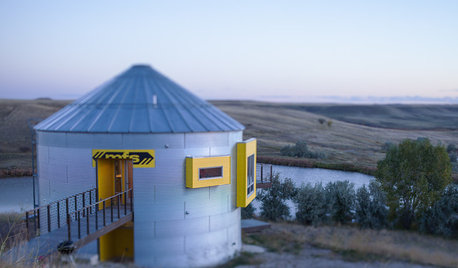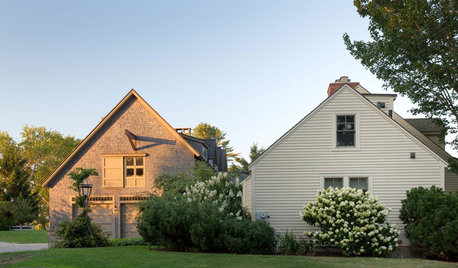Retiring to vs. Retiring from
cheerful1_gw
14 years ago
Featured Answer
Sort by:Oldest
Comments (35)
jakkom
14 years agolast modified: 9 years agoRelated Discussions
My Budget: Debt vs. Savings. vs. Retirement
Comments (5)Hi glavinsolo, When you buy your home, do you plan to cash in your MFs in order to achieve a down payment? You don't say what kind they are, but with expected rate of return of 8% I assume that they're equity-based. The expense rate of 0.5% makes me wonder about that, though, as few charge that low. If you plan to liquidate within a couple of years, if the markets go down, you may be an unhappy camper when it comes time to reclaim the investment. On the other hand, if you have the certificates issued, you can take them to a financial institution to use them as collateral for a loan ... ... which will work if your growth rate on the investment is greater than the rate you pay on your mortgage, after allowing for income tax cost and deductibility in each case. That way, you convert that investment from being a short-term one into a longer-term one, which reduces your short-term risk. Be aware, though, that a financial institution will be unwilling to loan you more than 50% (or at most 60%) of the value of the asset. But you carry some risk if you draw near the limit of what they'll allow, for if the value of the asset goes down and slips below double the value of the loan, the lender will want either some cash to reduce the amount of the loan, or some other assets to underwrite the support for the loan. And they'll want it today ... tomorrow at the latest. With regard to the cost of homes, I'm not familiar with the U.S. markets in general, let alone the ones in your area. But some calculate that the tough times in the housing markets are far from over. I think that it would be well for you to carry on some study of what house prices are doing in the area where you prefer to buy. If you buy early, and house prices continue to reduce, you'll be an unhappy camper, then, as well. Mortgage lenders get quite unhappy if the valuation of the house comes rather close to the amount of the mortgage still owing. If the value goes too low, they'll require that you sell it ... at a loss, of course ... ... or they may choose to foreclose, in which case there'd almost surely be more costs if they sell it than if you do. Which could well mean that they'd be notifying you that you owed them the difference between what you owed on the mortgage, plus costs of repossession and sale, less the amount that they sold it for. Not a pleasant scenario. But one that many who accepted those low-rate mortgages a few years ago will be facing. My feeling is that if I wanted to buy a home in the U.S. these days, I'd be keeping my money in my genes (sorry, "jeans") for a while. There are those who claim that I have some frugal chromosomes in my genes, as a matter of fact. As a matter of fact, my daughter is considering buying accomodation in Arizona, these days. Good wishes as you make your plans. ole joyful...See MoreRetiring from the work force - when?
Comments (35)tina...I do get what you are saying. We have volunteered a lot with the local food bank and our church. Many people need rides out of town and few can do it so DH and I are always called upon to give rides to those that have out of town appts for MD's and lengthy tests etc. We are gone a lot so it is a challenge to fit in volunteer work and travel, for sure ! I seem to never have much time to relax LOL! DH and I are on the go and this trip has been much the same..you have to be someplace every day by a set time...sigh... this will be my last bike tour with others...remember I said I hate too much structure...even if it is " fun" ! We have LOVED being on our own the past 2 1/2 weeks..no one to please but ourselves. You should have seen my face when the 1st B and B wanted to know when we wanted breakfast ...arrgghh ! I don't know !! It is SO fun tonight to be at our nephew's home near Den Haag..they are gone and we are borrowing their home...we can get up when we want :) Joanie...exactly..you said it perfectly ! Precisely what I was trying to convey..thank you ! If you are at all like DH and I you will have more trouble deciding "what to do next? ! " ..there are just too many great things and people and places out there and of course family comes first so that has made a big difference in our plans. We would move to Europe most of every Summer were it not for our children and now our lovely sweet grandson...so choices. May you have a lovely time deciding what joy to bring in to your life next . c...See More'Don't just retire from something ...
Comments (7)Hi Doug, I think that you are more courageous than I. Better start taking lessons now ... ... in how to cope with a teen when you are aged almost 80. I'm there now ... and glad that I don't have a teen to cope with daily. I think that one of my major tasks as a parent is to help my child prepare for independence. I grew up on a fairly large farm during World War II ... when the farmhands had all gone to war shortly after it started in 1939, when I was 10. I had lots of responsibilities, and increasing ones, to deal with from a rather young age. I'm of the opinion that if a child grows up knowing that as s/he shows him/herself able to cope reasonably well with responsibilities formerly given, that s/he knows that more will be granted, that much of the teen-age rebellion that troubles many might be, if not avoided, at least mitigated somewhat. Good wishes for a flourishing life. ole joyful...See MoreFrom what did you retire?
Comments (3)Well, pilgrim you have stumped me. I love to take forum names apart and give the members my own pet name for them, but I don't want to call you pil and I don't want to call you grim or ill or rim. Maybe I'll call you 555. It sounds full of mystery and intrigue, not unlike 007. Remember him? 555, sounds to me like it's time to make some short term fun goals. Work is definitely not what it is ALL about, but it is good. ful, We joked about my nickname for you, but honestly, it does describe you in many other ways too. How great it is that you are full of joy and can laugh at yourself and enjoy the other "old farts." It is wonderful that you have things you want to see, do and learn. Please keep posting lots and tell us about those things. Remember, you have a new audience now. You can even repeat for my benefit. Are you doing community/charity work to make your community a happier place in which to live? I used to do scads, but now pretty much limit it to the church. jan...See Moremaime
14 years agolast modified: 9 years agocheerful1_gw
14 years agolast modified: 9 years agomaime
14 years agolast modified: 9 years agosherwoodva
14 years agolast modified: 9 years agolinda_in_iowa
14 years agolast modified: 9 years agoretiredwendy
14 years agolast modified: 9 years agomaifleur01
14 years agolast modified: 9 years agocheerful1_gw
14 years agolast modified: 9 years agomaifleur01
14 years agolast modified: 9 years agomaifleur01
14 years agolast modified: 9 years agojoyfulguy
14 years agolast modified: 9 years agojakkom
14 years agolast modified: 9 years agocheerful1_gw
11 years agolast modified: 9 years agosushipup1
11 years agolast modified: 9 years agocheerful1_gw
11 years agolast modified: 9 years agocheerful1_gw
11 years agolast modified: 9 years agojoyfulguy
10 years agolast modified: 9 years agocheerful1_gw
10 years agolast modified: 9 years agosherwoodva
10 years agolast modified: 9 years agojim_1 (Zone 5B)
10 years agolast modified: 9 years agocheerful1_gw
10 years agolast modified: 9 years agosherwoodva
10 years agolast modified: 9 years agojakkom
10 years agolast modified: 9 years agoemma
10 years agolast modified: 9 years agocheerful1_gw
10 years agolast modified: 9 years agojoyfulguy
10 years agolast modified: 9 years agojoyfulguy
10 years agolast modified: 9 years agocheerful1_gw
9 years agolast modified: 9 years agojoyfulguy
9 years agolast modified: 9 years agoElmer J Fudd
9 years agolast modified: 9 years agocheerful1_gw
8 years agosherwoodva
8 years agocacocobird
8 years ago
Related Stories

HOUZZ TOURSHouzz Tour: Prairie Grain Bin Turned Bucolic Retirement Home
An agrarian structure and a big dream combine in this one-of-a-kind home that celebrates 250 acres of Montana grasslands
Full Story
REMODELING GUIDESWhen Retirement Came Early, a Couple Headed for the Hills
A Seattle pair turn their part-time home into a full-time one, remodeling it to gain views and help it stand up to snow, sun and wind
Full Story
HOUZZ TOURSMy Houzz: A Portland Couple Builds Their Dream Retirement Home
An Oregon couple emphasizes indoor-outdoor living and accessible design in their energy-efficient, visitor-friendly house
Full Story0

LIFERetirement Reinvention: Boomers Plot Their Next Big Move
Choosing a place to settle in for the golden years? You're not alone. Where boomers are going and what it might look like
Full Story
HOUZZ TOURSWe Can Dream: Rural Retirement Home a Haven of Beauty and Tranquillity
A retired couple builds a spacious Japanese-inspired indoor-outdoor sanctuary to enjoy with extended family
Full Story
HOUZZ TOURSHouzz Tour: Retiring to a Midcentury Modern Gem
Vintage furniture fits the tone of this 1950s home, designed by modernist A. Quincy Jones, to a T
Full Story
HOMES AROUND THE WORLDHouzz Tour: Retired Soldier Creates Her Dream Home in Sweden
A Swedish family's fantasy of a rural retreat becomes a reality after years of renovations
Full Story
HOUZZ TOURSHouzz Tour: From Summer Cottage to Full-Time Home
A retired NHL player and his family expand their former vacation home with a big addition and an interesting side-by-side design
Full Story
ARCHITECTUREHouzz Tour: A Salvaged Airplane Becomes a Soaring Hillside Home
Made from a retired 747, this modern house in Malibu shows how architecturally stunning reuse can be
Full Story
COLORNo Need to Shrink From Violet
With shades from soft to rich and uses from a droplet to a wave, there’s a violet that will work for you
Full StorySponsored



maime